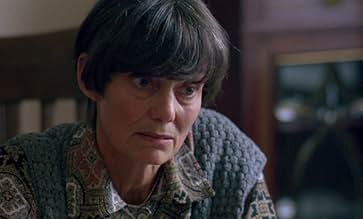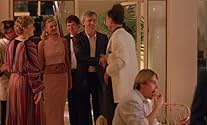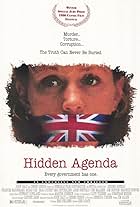IMDb RATING
6.2/10
586
YOUR RATING
A singer swaps the political intimidation of working in East Germany for the equally controlling capitalist music industry in the West.A singer swaps the political intimidation of working in East Germany for the equally controlling capitalist music industry in the West.A singer swaps the political intimidation of working in East Germany for the equally controlling capitalist music industry in the West.
- Awards
- 1 win & 1 nomination total
Heike Schroetter
- Marita
- (as Heike Schrötter)
Heinz G. Diesing
- Jürgen Kirsch
- (as Heinz Diesing)
Thomas Öhlke
- Young Drittemann
- (as Thomas Oehlke)
- Director
- Writer
- All cast & crew
- Production, box office & more at IMDbPro
Storyline
Did you know
- TriviaFilm inspired by East German committed singer Gerulf Pannach's real life story.
- Alternate versionsWhen shown on ZDF in Germany, the scene in which Klaus attacks the Christian Democrat politician was cut (Fuller, 1998, p.62).
- ConnectionsFeatures Bilitis (1977)
- SoundtracksGuilty
Performed by Randy Newman
Featured review
Supposing this comment was not about "Fatherland", what would the sentence "Berlin filmed in the final years of its partition" call to mind? I am pretty sure most film fans would answer "Wings of Desire", Wim Wenders' iconic portrait of Germany's former (and future) capital. Few would think of Ken Loach and his mostly overlooked 1986 "Fatherland". And yet, this modest movie is as eloquent - not to say more - as Wenders' creative allegory of the Berlin of the late eighties, a couple of months before the fall of the disgraceful Wall. In "Fatherland", both the East and the West Side of the cities are shown in a very documentary-like style, including the Wall that parts them, complete with its checkpoints, watchtowers and memorial crosses at places were "defectors" got gunned down. And did you know that half a dozen of the technicians who worked on "Fatherland" would embark on Wim Wenders' "Wings of Desire" one year later?
The story (for there is one) concerns a protest singer by the name of Klaus Drittemann (his second name meaning "Third Man", an obvious allusion to Graham Greene, Harry Lime and another German city partitioned after the war, Vienna). An East German citizen, Drittemann has annoyed the communist authorities with his committed songs so much so that he is now banned from performing on the scenes of his country. Worse, he is forced to emigrate to West Berlin, leaving his wife and little boy behind. Across the border, he is awaited by the executives of an American record company who are eager to turn his "defection" into big bucks and untold political propaganda. But Klaus won't be exploited so easily and soon proves more interested in tracking down his father, a concert pianist who also left his family in East Berlin and who has disappeared for a decade.
This first part of the film rings amazingly true and it is easy to figure out why. As a matter of fact, "Fatherland" tells the true story of his main actor, Gerulf Pannach. A protest singer himself in East Germany, jailed in the seventies, forced to emigrate to the West; Pannach performs his own songs, the most remarkable of which being his aptly titled "Singing the Blues in Red". The icing on the cake is that Gerulf Pannach is an excellent actor (although this was to be his only appearance on the silver screen) and he brings a note of brooding determination and ironic disillusionment that enriches his character. On the other hand, in this first half, Loach manages to present the two sides in an impartial way, putting forward their mutual good and bad points. This is made possible thanks to Klaus Drittemann/Gerulf Pannach's attitude, at ease neither in the communist nor in the capitalist system.
The second part, although more suspenseful than the former one, is a bit baffling at first. With Klaus in search of his missing father, isn't Ken Loach starting a new, independent story and losing the thread? Indeed, he has his main character leave Germany for England, on more familiar ground, the viewer thinks a bit ironically. A new character is even introduced, Emma, a French-Dutch journalist, who has found out the address of Drittemann's father, now living in hiding in Cambridge as James Dryden. But as soon as the conversation between the Harry Lime-type father and his son starts everything finds itself in its place again: the issue is Germany and how free people can get in a place where they can be under the yoke of Nazism, Communism or Capitalism. Besides that this second section is enhanced by the presence of Fabienne Babe, a fresh unaffected actress who does justice to a role which is not without ambiguity.
All in all, this is a thought-provoking, historically important work that would deserve to be better known.
The story (for there is one) concerns a protest singer by the name of Klaus Drittemann (his second name meaning "Third Man", an obvious allusion to Graham Greene, Harry Lime and another German city partitioned after the war, Vienna). An East German citizen, Drittemann has annoyed the communist authorities with his committed songs so much so that he is now banned from performing on the scenes of his country. Worse, he is forced to emigrate to West Berlin, leaving his wife and little boy behind. Across the border, he is awaited by the executives of an American record company who are eager to turn his "defection" into big bucks and untold political propaganda. But Klaus won't be exploited so easily and soon proves more interested in tracking down his father, a concert pianist who also left his family in East Berlin and who has disappeared for a decade.
This first part of the film rings amazingly true and it is easy to figure out why. As a matter of fact, "Fatherland" tells the true story of his main actor, Gerulf Pannach. A protest singer himself in East Germany, jailed in the seventies, forced to emigrate to the West; Pannach performs his own songs, the most remarkable of which being his aptly titled "Singing the Blues in Red". The icing on the cake is that Gerulf Pannach is an excellent actor (although this was to be his only appearance on the silver screen) and he brings a note of brooding determination and ironic disillusionment that enriches his character. On the other hand, in this first half, Loach manages to present the two sides in an impartial way, putting forward their mutual good and bad points. This is made possible thanks to Klaus Drittemann/Gerulf Pannach's attitude, at ease neither in the communist nor in the capitalist system.
The second part, although more suspenseful than the former one, is a bit baffling at first. With Klaus in search of his missing father, isn't Ken Loach starting a new, independent story and losing the thread? Indeed, he has his main character leave Germany for England, on more familiar ground, the viewer thinks a bit ironically. A new character is even introduced, Emma, a French-Dutch journalist, who has found out the address of Drittemann's father, now living in hiding in Cambridge as James Dryden. But as soon as the conversation between the Harry Lime-type father and his son starts everything finds itself in its place again: the issue is Germany and how free people can get in a place where they can be under the yoke of Nazism, Communism or Capitalism. Besides that this second section is enhanced by the presence of Fabienne Babe, a fresh unaffected actress who does justice to a role which is not without ambiguity.
All in all, this is a thought-provoking, historically important work that would deserve to be better known.
- guy-bellinger
- Jun 25, 2007
- Permalink
Details
- Release date
- Countries of origin
- Languages
- Also known as
- Vaterland
- Filming locations
- Production companies
- See more company credits at IMDbPro
Contribute to this page
Suggest an edit or add missing content

Top Gap
By what name was Singing the Blues in Red (1986) officially released in Canada in English?
Answer






















